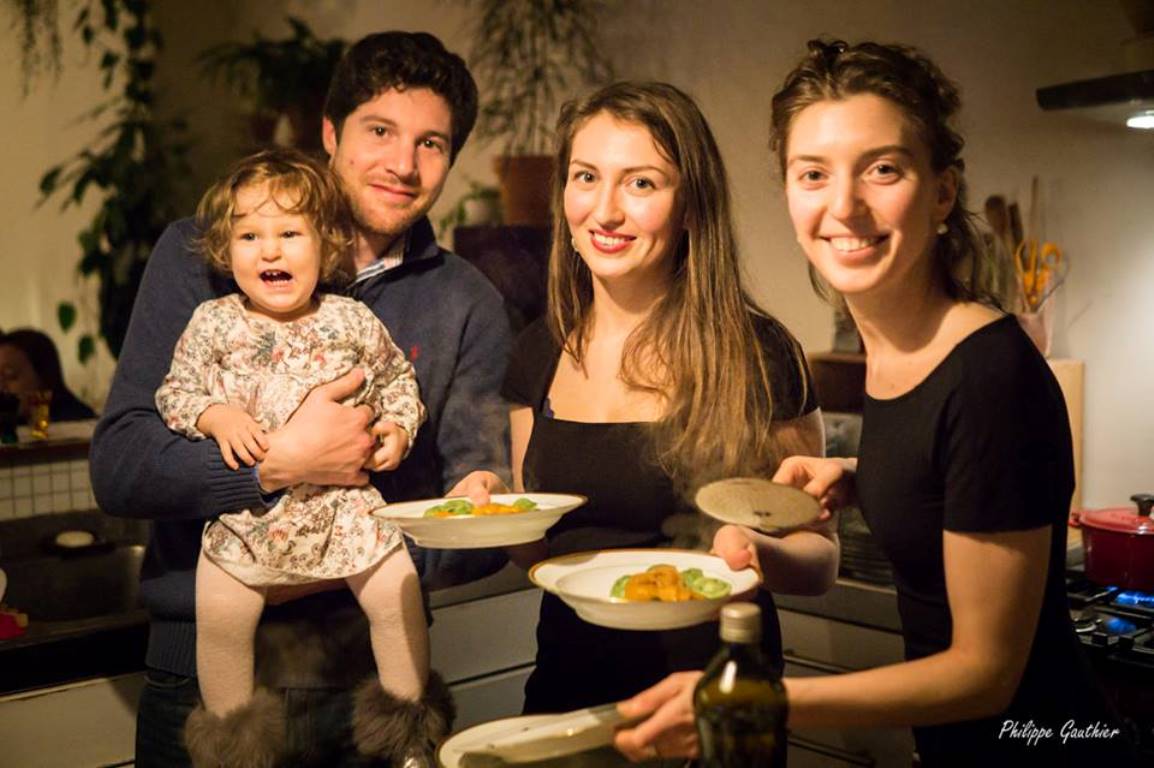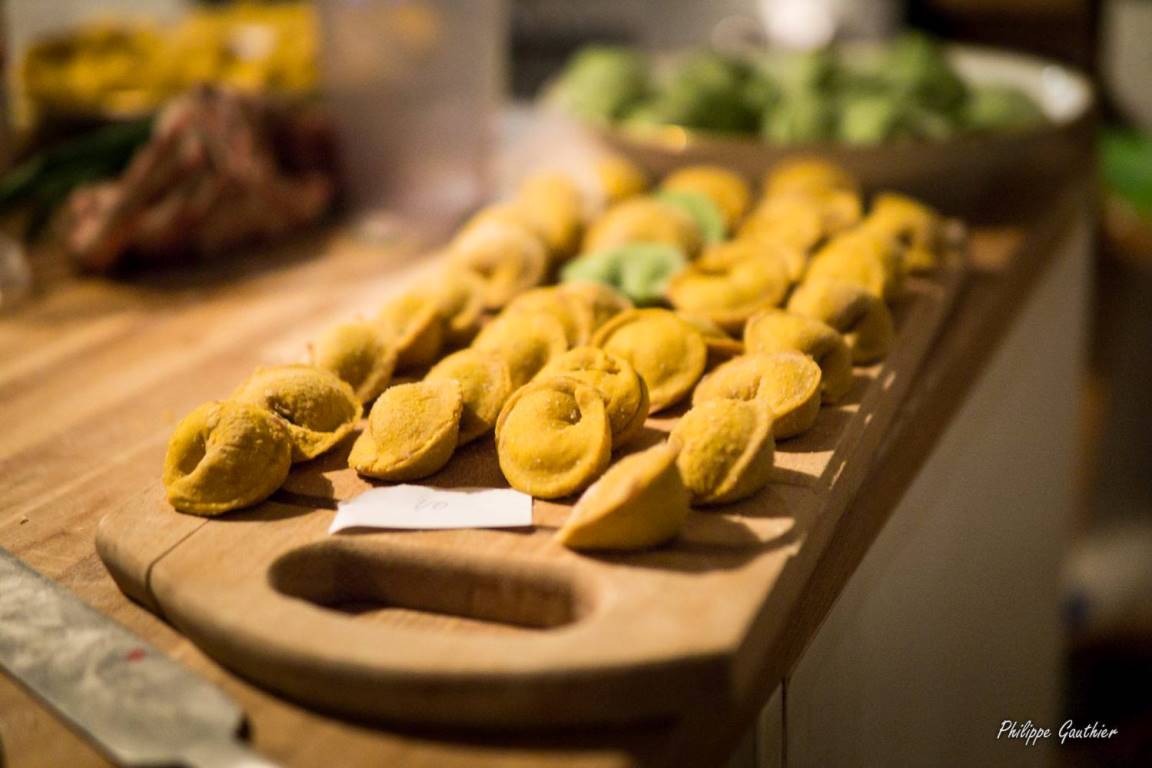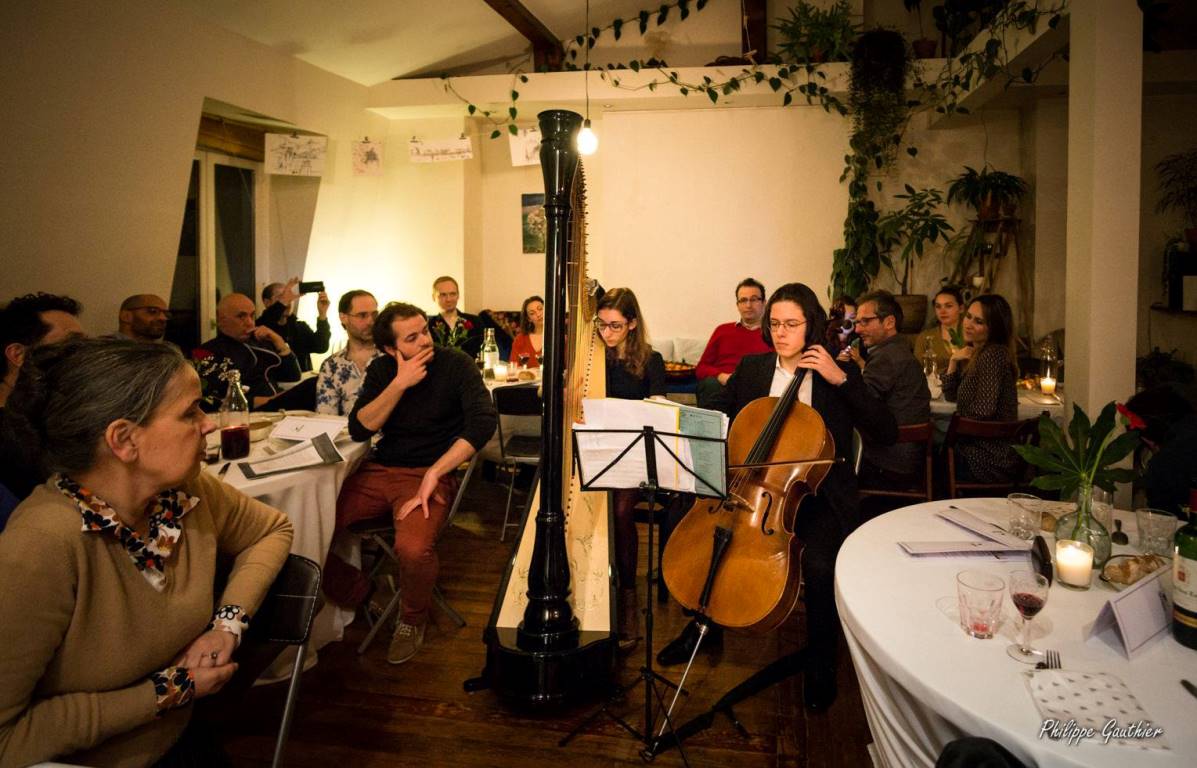‘I’ve Attended UN Models, but Have Never Seen So Many People Leaving the Table in Love with Russia’
In 2017, Dilara Khannanova and Sofia Petrichenko, HSE graduates, created a ‘Gogol de Paris’ association in Paris, which popularizes not only Gogol’s writing, but also Russian cuisine with its feast traditions. The project authors spoke to the HSE News Service about ‘Gogol’, Gogol, the uniting power of Russian cuisine, and charity.
How did you find yourself in Paris?
Dilara: after graduating from the Faculty of Business Informatics, I entered a master’s programme ‘Business Process Management’ at the same faculty. Before the admission, I won an internship by Hilti for education at Hochschule Liechtenstein. This programme included a combination of work and studying in the company’s Swiss office. The six months I spent in Liechtenstein were a revelation for me not only professionally, but personally. After Moscow’s crazy rhythm, the slow and regular life in a small kingdom made me rethink many things. After the programme, I was offered a job at Hilti, and was going to go back after the master’s programme. But thanks to the Erasmus programme, I spent the second year of studies abroad as well.
I went to France without knowing a word in French. I magically managed to convince the French consulate and everyone else that I would master it in two weeks, and got a visa. Of course, it didn’t take two weeks, but I did learn French. It was incredibly hard during the first few months, since I understood absolutely nothing! But thanks to my desperate situation, I learned the language. At the end of the year, I defended a thesis in French, which was a huge surprise to the professors.
After completing my studies, I was going to go back to Switzerland, but I met my future husband. I had to leave the carefree life of a student and start actively searching for a job, since a French degree doesn’t guarantee a residence permit in France. In search of a job, I came to Paris, where I lived with Sonya [Petrichenko] and her classmates – at first, in a magnificent mansion behind Les Invalides, where they were renting a room, then in a damp attic with a view of the Eiffel Tower, and then in a transformer apartment, where the bed turned into the ceiling every morning. Despite low demand on the job market, I found a job rather quickly in a U.S. fintech company, where I still work today. Of course, it was thanks to a certain amount of luck, but ‘fortune favours the bold’. The Faculty of Business and Management offers a lot of various exchange programmes today, many more than when I studied there. I believe that the experience of living and working abroad will open up something new to everyone, and will enrich and diversify their lives, so I recommend everyone, despite any doubts, to go for it.
I became that type of Parisian student who has five part-time jobs, lives in a ‘closet’, and at the same time experiences a cinema-style life, in which the most incredible things can happen
Sofia: I first came to Paris in 2009, right after graduating from the HSE Faculty of Politics. I went on a student exchange programme to SciencesPo, to a master’s programme in international relations. I studied theatre and politics in Moscow, and when I came to Paris, I had to choose another topic, thiswas the European Union. For one year, I worked on this topic, which was completely new to me, and put my previous interests on the back burner.
Dealing with the language was difficult: I had to understand, to translate in in my head, to invent an answer, and then to translate it once again – in most cases, I didn’t have time for all these operations, so I was quietly making notes and admiring everything around me. But while I had certain problems with the language, SciencePo itself was very similar to HSE, so I had no issues with integration.
When I came back to Paris in 2012 to study arts, I became that type of Parisian student who has five part-time jobs, lives in a ‘closet’, and at the same time experiences a cinema-style life, in which the most incredible things can happen. After graduating in Arts and Literature from the National Institute for Oriental Languages and Civilizations (Inalco), I decided I wanted to be involved in cultural projects. That’s how Je lis! project, organizing meetings for students with writers and translators from Russia, appeared. I shared my idea with Rusinalco, an association of Russian-speaking students, and they supported my initiative, so in November our university welcomed Sergey Volkov, Associate Professor at the HSE School of Philology, and Tatyana Kuchina, philologist and lecturer at the Yaroslavl Teacher Training University. Tatyana and Sergey opened the club and in doing so, gave us their blessing. This year was one of surprising and thrilling meetings. We welcomed Marusya Klimova and Andrey Ivanov, writers, Galina Akkerman, translator and journalist, Yaroslav Leontiev from MSU, an expert in Russian Social-Revolutionaries and Silver Age, and Mahaut de Cordon-Prache, a unique French specialist in the works of Nadejda Teffi. The meetings are open to anyone interested and take place monthly in French, or in Russian with translation.

Dilara Khannanova and Sofia Petrichenko. Photo by Philippe Gauthier
When and why did you create the Gogol association and what does it do?
Dilara: Initially, we had the idea of making a kind of stylish event, which would bring together various aspects of our culture. After a long pause in our connection, several moves to other apartments and universities, we met one December day for a lunch on Boulevard Haussmann. We had five years’ worth of events to discuss, but at a certain moment, we almost simultaneously mentioned that there were no good Russian restaurants in Paris, where we would be willing to go ourselves and invite our French friends.
Sofia: I’m often asked about Russian restaurants by friends and students. When I once had an idea to invite my friends from the Russian-speaking club to a restaurant, I found out that the atmosphere in most Russian restaurants is kitsch, with vulgar music. Probably, some of these restaurants meet their owners’ nostalgia for post-Soviet freedom, when food was still as delicious as in childhood, but the songs were completely tasteless. Having no nostalgia, but a craving for beauty, we soon agreed that Russian cuisine mostly exists in our mums’ and grandmas’ kitchens, not in expensive restaurants, and it’s usually better when cooked from home recipes. Initially, we considered the idea of organizing dinners as an enterprise, but concluded that was not what we wanted from our project. Our main idea is to introduce people to Russian culture and, particularly, to the Russian feasting tradition. That’s why we decided to organize our dinners as part of the association.
We remembered that Gogol was a hearty eater, as are we, and the French value a good meal! That’s why we decided that Gogol and the French would become friends for sure
We carried out the first dinners as an informal get-together. We needed to meet each other, to understand how the idea works. Today, Gogol de Paris is an officially registered association, as part of which we are developing our project.
Why Gogol?
Dilara: Because he has a good-looking profile (laughs). The idea for Gogol came on the spur of the moment; we just liked the sound of it. But before approving this option, we spent a long time analyzing whether he suited us as a symbol. First, Gogol made a huge contribution to the Russian culture. Second, he is one of the few Russian writers familiar to the French, although not as well known as Tolstoy or Dostoevsky, so there is still much to learn.
Sofia: We also remembered that Gogol was a hearty eater, as are we, and the French value a good meal! That’s why we decided that Gogol and the French would become friends for sure. In addition to that, Gogol liked to eat well, but didn’t like to cook and host dinners, and always went to have dinner at friends’ houses, for example, at the Aksakovs’. And finally, Gogol lived in Paris, so we thought, why not remind Parisians about this, and that’s why we called our association ‘Gogol de Paris’. Dinners are the main activity performed by our association today. We launched the project in January 2017 and have carried out five events this season.

Amber pelmeni with lamb, ginger, and turmeric, and emerald pelmeni with parsley and beef. Photo by Philippe Gauthier
What are the ‘dinners at Gogol’s’ like? Why do you focus on the cuisine?
Sofia: Our dinners are more of an event than simply a meal at a restaurant. Each dinner has a certain theme: we compile a thematic menu, invite musicians, and create the room décor. Our past dinners’ themes were Christmas Magic, Maslenitsa, Beef Stroganoff à la Française, Easter Dinner, and Suburban Dinner.
We try to immerse our guests in the atmosphere of a Russian feast. We tell them the history of the dishes we serve and the Russian traditions, as well as anecdotes related to certain culinary events of the ingredients used. In the middle of the dinner, we serve ice-cold vodka and drink to Nikolay Gogol’s health, and, of course, Vive la France, Vive la Russie!
Dilara: Each dinner is accompanied by music: classical (violin, harp, and cello), contemporary (songs to the guitar or piano), traditional (accordion and balalaika), or readings from Gogol’s plays and novels. But our main difference from a restaurant is the home-like feeling. We serve dinners not more than for 43 people; here you can ask for a second helping and drink with the musicians, who will eat alongside you after the music.
Why cuisine? Because many other aspects of Russian culture, such as literature, music, and ballet, are already known to the public. Speaking about food, as I said, it’s really hard to find anything like my grandma’s dressed herring or borsht. That’s why we decided not to sit around and wait, but fill this gap ourselves. We are planning to expand our activities in future. We are actively looking for collaborations with other associations interested in popularizing Russian culture in Paris and are considering various ideas that could be implemented in the near future.
Sofia: As a political scientist, I would say that food has turned out to be an amazingly effective soft power tool. I’ve attended UN Models, but have never seen so many people leaving the table in love with Russia. So, pelmeni c'est le vrai pouvoir! (real power).We cook all our dishes ourselves. Some of the dishes are cooked the evening before the dinner, some of them before the guests arrive, and some on an open kitchen when the guests are present. These are usually desserts. When we design the menu, we try to focus on the main dishes of Russian cuisine (pelmeni, dressed herring, pancakes, pies, beef Stroganoff, berry desserts, etc), adding a pinch of innovation and originality.
‘Dinner at Gogol’s’ menu, January‘Dinner at Gogol’s’ menu, February
‘Dinner at Gogol’s’ menu, April
Where do the dinners take place?
Sofia: According to the project concept, the dinners take place at various locations. We do well at spacious private apartments, such as at our friends’. We organized the first three dinners at our friend Matilda’s charming apartment with a view of the Paris rooftops. We bought everything that we needed for the dinner, trying to create that special événement russe: round tables, white tablecloths, silver cutlery, glasses, cups, and teapots.
Each dinner is accompanied by music: classical, contemporary, traditional (accordion and balalaika), or readings from Gogol’s plays and novels
Dilara: In fact, we are open to various options. For example, in June we hosted a charity dinner together with the Russian embassy on Quai Branly at the new Russian Cultural Centre. And in July, we organized a Russian dinner at a tango festival.
Who comes to the dinners? How do people learn about them?
Sofia: The dinners attract French people who are interested in Russian culture, or those who know nothing about the cuisine and the culture, but want to try something new. It is very Parisian – to try something new. The whole of Paris tries something new every evening. We also welcome our friends and friends’ friends, who are interested in the concept and miss Russian food. We announce the dinners on Facebook, as well as via personal invitations. Soon, we are launching a website for the project, in order to give more information about the project and attract a new audience. Our guests say that this atmosphere is a rare thing in Paris. The best feedback is our smiling guests, who not only don’t want to leave, but stay to help us wash the dishes and take out all our Gogol utensils at 2 a.m., and then ask us when the next dinner will be!
How much does a dinner cost and how do you spend the profit?
Dilara: Since our main goal is to promote the Russian culture, our prices are quite affordable. Profit is not the main purpose of our activity. In most cases, the price of the dinner including the first and second course, a dessert, and vodka, is €35-50 per person. When we organize special events together with other associations, the price may be higher, in order to raise funds for a certain charity project. But we don’t have a system of donations; people come not to donate, but to eat, talk and enjoy the night.

‘Dinner at Gogol’s’. Photo by Philippe Gauthier
The money that is left after covering the costs stays in the association’s account. It is spent on project development, charity events, or is donated to charity funds. For example, we transferred the income from the first two dinners to our friends who regularly help an orphanage. They bought traditional Russian costumes for the dancing studio.
How are you going to develop the project?
Dilara: We are planning to organize Russian literature readings at Paris hospitals and old people’s homes. We came up with the idea of literature follow-ups to the dinners when we were thinking about what charity events we wanted to do. We understood that we wanted to combine charity with Russian culture. We believe that literature readings will be something that meets our aspirations.
Sofia: For me, it is a kind of combining my literature project at Inalco and the Gogol project. As a result, we want to attract students of Russian language and literature to our project, and use our association’s funds to organize literature meetings for children and the elderly, to read Russian tales, novels and poetry together, and to conduct short lectures about Russia.
Dilara: Speaking about our main activity, we are now trialing the format of dinners and our opportunities; we are studying this professional sphere, looking at what we can do, how we can change and develop the project. Probably, in the next season we’ll have new partners and new formats. We are thinking about masterclasses, dinners with short lectures on the anthropology and sociology of Russian cuisine, and business cocktail parties with professional networking for people willing to do business on the Russian market.
Sergey Volkov

